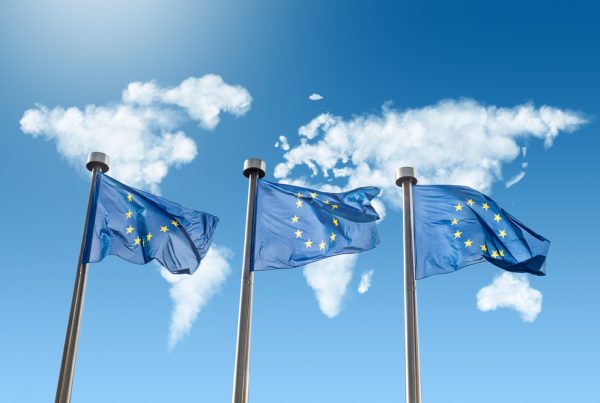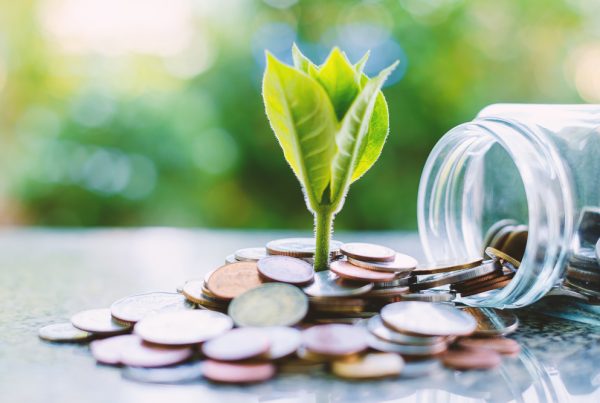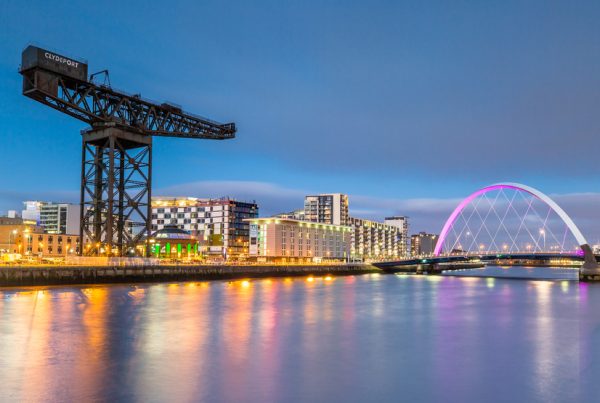Insights from COP26
Catching up on a busy week at COP26? SEC Newgate UK has a team at the event in Glasgow providing bitesize daily updates in our ‘Insights from COP26” blog series – read this week’s daily round ups below.
Day 1 – Glasgow’s still game
By Ian Silvera
Has London Euston ever been this busy at five in the morning? Hundreds had gathered at the gateway to the North to wait and see if they were going to get home, to work and to where they had originally intended to.
Those plans were eradicated on Sunday when first a tree fell on electrical lines between Rugby and Milton Keynes and then further stormy weather put the East Coast main lines down.
What followed was a Wacky Races-style adventure to Glasgow, with COP26 attendees jumping on last-minute flights, booking out rental cars and some trying their luck with the trains. Others sought shelter and got a room for the night.
Come Monday it was a literal leap into the dark until we hit Rugby, with the train running smoothly and dawn breaking. We hurtled up to Preston, Carlisle and then finally Glasgow.
Scotland’s second city has had a scrub-up pre-COP and despite the background media noise of a bin strike, which would have ran alongside a now averted regional rail strike, Glasgow had put on its Sunday best and offered up its unique charm.
As we rolled into Glasgow Central, the sun began to breakthrough the clouds and bounce off the city’s cranes, a throwback to when this place was an engineering giant. A quick coffee and a friendly “where’s ya goin’?” and off to the COP26 area just outside the city centre.
Despite the queues elsewhere — see Lobby Twitter — everyone is in good spirits, including the jovial bus drivers. Looks like Glasgow is still game, but is the rest of the world?
Day 2 – Signs of progress
By Andrew Adie & Dafydd Rees
COP26 started shrouded in pessimism and doubts about whether global consensus on new carbon reduction targets was possible to achieve.
Today, at the first full day of the Glasgow Conference, a wave of pledges and new decarbonisation commitments have been made and are raising hopes that some tangible progress could be made towards net zero.
The big set piece of the day came from US President Joe Biden, EU Commission President Ursula von der Leyen and Canada’s Prime Minister Justin Trudeau who pledged (alongside more than 80 other countries) to cut methane output by 30% by 2030. Ursula von der Leyen described the agreement as “one of the most effective things we can do” to meet the Paris Agreement target to limit the rise in lobal average temperatures to 1.5C.
The BBC reported that she concluded by stating: “We cannot wait for 2050, we have to cut emissions fast. It is the lowest hanging fruit.”
We also saw a deal by more than 100 countries to reverse deforestation over the next decade which has been billed as a landmark agreement by the UK Prime Minister, Boris Johnson.
Signatories of the Glasgow Leaders’ Declaration on Forest and Land Use will commit to protect forest ecosystems. The pledge includes almost $19bn of public and private funds. Signatories include Brazil, China and the Democratic Republic of the Congo. 28 countries representing 85% of the world’s forests will commit to remove deforestation from the global trade of products such as palm oil, soya and cocoa.
In other developments:
- Philanthropists have announced the creation of the Global Energy Alliance for People and Planet which aim to attract ten times the initial investment made. The Rockefeller and Ikea foundations hope their initiative will provide funds for the energy transition of poorer nations. The Bezos Earth Fund will be giving $500m to the project.
- Narendra Modi, Prime Minister of India, surprised the Climate Summit when he said that his country, the world’s third biggest carbon emitter, would reach net zero by 2070, with 50% of its energy by 2030 generated from renewable sources. Mr Modi also demanded that developed countries provide $1 trn in climate finance for developing countries as soon as possible.
- Brazil promised to cut greenhouse gas emissions by 50% by 2030.
- Columbia has said it will protect 30% of its territory for nature by the end of 2022.
- The UK has announced a new initiative to help developing countries access green technologies. It involves a doubling of UK funds to more than £3bn over 5 years.
- Boris Johnson is set to announce a sovereign guarantee for a $1bn World Bank loan for India to develop green infrastructure.
- The UN Secretary General called on countries to update climate pledges annually rather than once every five years. The UN is to set up an expert group to analyse the net zero commitments of non-state actors.
- Around 40 countries are to scale up clean tech by imposing global standards with a focus on five sectors. Boris Johnson is holding a press conference this afternoon.
- Green Grids initiative: UK and India pledge endorsed by 80 nations to create continental electricity supergrids including solar energy.
- The African Union is calling on philanthropists and governments to support $2.5bn a year for the next five years for climate adaptation measures. President Ramaphosa says UK and US pledged $8.5bn in funding for South Africa’s move away from coal to clean energy.
- US Climate Envoy John Kerry says rich countries have now pledged $98bn of the £100bn annual investment for developing countries (originally promised in 2009).
- Blackrock told the Green Horizon Summit that it has raised $673m for investments in climate infrastructure in emerging markets.
The Green Horizon Summit@COP26 (a joint initiative from the City of London Corporation and Green Finance Institute) also had a day of events including key notes from Mark Carney (UN Special Envoy for Climate Action and Finance) and Larry Fink (CEO of Blackrock).
The theme coming from these events was that there is a significant amount of money being invested and ready to be invested to accelerate the transition to a net zero economy.
Lord Nicholas Stern (Chair of the UCL Grantham Research Institute on Climate Change and the Environment at the London School of Economics) said that he believed COP26 “is the first COP where the private sector is out in front, pulling governments along” and that the journey to net zero is “the growth and development story of the 21st Century.”
Tomorrow is Finance Day with a keynote from UK Chancellor of the Exchequer, Rishi Sunak, with a promise of more pledges and new policy initiatives from all the nations’ present. All will be set against stark warnings from delegates about the risks of inaction and the mission to ‘ensure a just transition to net zero’ a theme that has resonated throughout the first day.
Day 3 – The wall of money
Finance Day at COP26 has delivered some big numbers and commitments that will have an impact on every UK-listed company and ultimately on their supply chains as well.
Opening Finance Day, Rishi Sunak, UK Chancellor of the Exchequer, announced that every company listed on the UK stock exchange must publish net zero transition plans from 2023. This scheme will be drawn up by a new Transition Plan Taskforce and overseen by the Financial Conduct Authority that will set a ‘science-based gold standard’ for the plans – which will need to include targets to reduce greenhouse gas emissions, and steps which firms intend to take to get to net zero.
While the news has been greeted with some reservations by NGOs (with some pointing out that unless the commitments made by business are legally required to be mandatory – i.e. not just the publishing of the plan but the delivery of the ambition – then there is a risk that business will use the plans as a route to greenwashing.
This of course assumes that the court of public opinion and scrutiny of business by all stakeholders is not a strong enough incentive for business to develop a credible plan and stick to it, which we’d argue is a powerful incentive in itself.
The Chancellor is promising nothing less than a rewiring of the entire global financial system which will make the UK the first carbon neutral financial centre. The UK has also convened over 30 other countries to back the creation of new global climate reporting standards by the IFRS Foundation. Welcome announcements but the devil will be in details to emerge.
In other significant developments, Mark Carney’s GFANZ (Glasgow Financial Alliance for Net Zero), a coalition of 450 global financial institutions which was only created in April and now represents 40% of the world’s financial assets, has announced it has up to $130 trillion of private capital committed to hitting net zero emissions targets by 2050. This after signing up all the major Western banks. Mark Carney (the UN Special Envoy Climate Action & Finance) has said that this means there is enough finance in place to fund the transition to a net zero economy now we just need the projects.
Michael Bloomberg, founder and majority owner of Bloomberg, is to join Mark Carney as co-chair of GFANZ. Mr Bloomberg and Mr Carney have co-authored a leading article this morning in which they declare “to fight climate change, put markets to work.”
World leaders may now be leaving COP26 but yesterday saw a raft of announcements and pledges by the nations who were attending the Summit. Some 103 countries have now signed a deal to reduce methane emissions by 30% by the end of the decade and UK Prime Minister Boris Johnson has said he’s optimistic that developed countries will meet the target of reaching $100 billion-worth of climate finance to help poorer countries to decarbonise.
That optimism will need to translate into tangible impact and money as the divide between the richer nations (who are the world’s largest carbon emitters) and the developing nations (which face the greatest relative cost and impact from climate change) has been a consistent theme and a lightning rod for calls for a ‘just transition’ to net zero that sees aid and assistance from the G20 flowing to the rest of the world to meet climate targets.
As today draws to a close at COP26, the Sports for Climate Action Framework (which includes the International Olympic Committee, FIFA, Athletics Kenya, BBC Sport, the Premier League, Formula E and Munster Rugby) has also committed to delivering net zero by 2040 and to reducing greenhouse gas emission by half by 2030.
One theme that continues to build, and will no doubt be a talking point tomorrow at Energy Day is the role of business in driving the transition. COP26 is constantly being discussed as ‘the business COP’, the COP where the private sector stepped into the spotlight and is finding the funding and solutions to drive net zero. One speaker today at the Green Horizon Summit@COP26 described it as ‘the moment that the troops arrived from the private sector’. It’s a huge opportunity for business to show environmental and social stewardship and deliver impact in a world that will have to change and decarbonise faster but, as today’s green wash protests also showed, it presents reputational and existential risks for those organisations that don’t have a credible plan and deliver it.
Day 4 – Energy Day and the demise of coal
Alok Sharma, President of COP26, started Day 4 (Energy Day) by declaring that ‘the end of coal is in sight’ as more than 40 countries signed up to pledge that they would phase out the use of coal fired power generation.
While the news provided a positive backdrop to discussions, the countries joining the pledge did not include major coal users such as Australia, China, India or the US. The UK Government says more than 190 nations and organisations have now vowed to quit the use of coal.
Around 20 countries (including the UK, US and Canada) have also signed up to a deal to stop public funding of ‘unabated’ fossil fuel projects in other countries.
There has also been positive news with research from the University of Melbourne finding that the pledges to limit carbon emissions made in Glasgow could keep world temperature rises to below 2C. Separate analysis from the International Energy Agency into the impact of the pledges made so far at COP26 has calculated that they will be enough to allow the world to keep to a 1.8C degree rise in global temperatures (assuming that the pledges are met).
While above the 1.5C global warming ceiling that is the aim of COP26 (and delivers to the Paris Agreement levels) it provides encouraging signs that progress being made could have a tangible impact.
However other data out today underlines why COP26 needs to deliver, with the Global Carbon Project releasing a report that has predicted that CO2 emissions will spike again this year, rising by 4.9% in 2021 having fallen by 5.4% in 2020 as a result of Covid driven lockdowns and reduced economic activity. China accounts for almost a third of global carbon emissions.
COP26 has also seen significant discussions about the development of new energy infrastructure, from renewables to green and blue hydrogen, and to the need to accelerate the roll out of energy storage and carbon capture technology.
It feels like the elephant in the room is now consumers. SEC Newgate’s own ESG Monitor survey (released last month) showed that the environment and climate top public concerns. Yet if industry and politicians are making significant moves to channel finance and action in decarbonising the energy sector and global economy (albeit with significant work still needed) the next ‘workstream’ is individual consumers (heating, transport, lifestyle and consumption).
While decarbonising our lives demands clear policy direction and the availability of infrastructure, products and services that enable that net zero transition, post-COP the world’s consumers (particularly those in G20 countries) will also be expected to start driving changes in their lives in the road to a green future. Energy Day has laid some foundations for that move.
Tomorrow is Youth & Public Empowerment day and will see the Friday for Future marches through Glasgow. It’s likely to be a moment when those consumer voices rise to the fore.
The SEC Newgate Global ESG Monitor is a groundbreaking research project across 10 countries that examines how environment, social and governance issues are influencing perceptions of business and governments.
CLICK HERE
TO DOWNLOAD THE ESG MONITOR REPORTS








